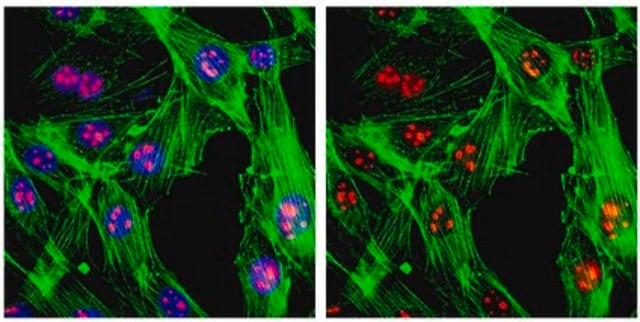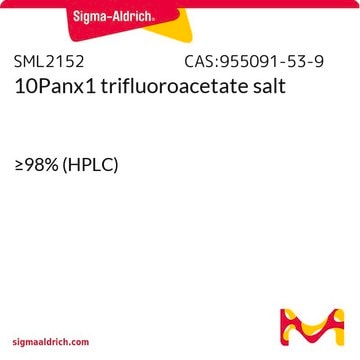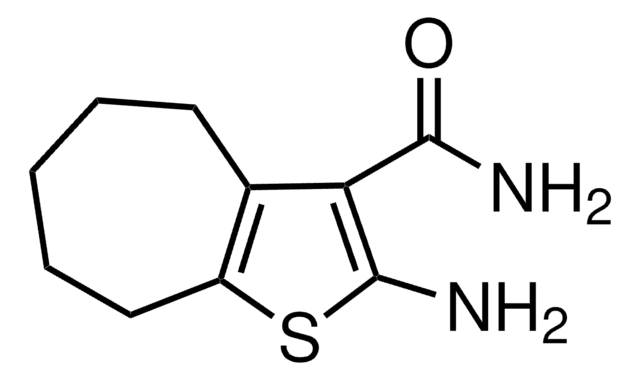480870
Neurotrophin Antagonist, Y1036
The Neurotrophin Antagonist, Y1036 controls the biological activity of Neurotrophin. This small molecule/inhibitor is primarily used for Neuroscience applications.
Synonym(s):
Neurotrophin Antagonist, Y1036, 3-[4-Oxo-5-[[5-(4-sulfamoylphenyl)-2-furyl]methylene]-2-thioxo-thiazolidin-3-yl]propanoic acid
Sign Into View Organizational & Contract Pricing
All Photos(1)
About This Item
Empirical Formula (Hill Notation):
C17H14N2O6S3
Molecular Weight:
438.50
UNSPSC Code:
12352200
NACRES:
NA.32
Recommended Products
Quality Level
Assay
≥90% (HPLC)
form
solid
manufacturer/tradename
Calbiochem®
storage condition
OK to freeze
protect from light
color
yellow
solubility
DMSO: 50 mg/mL
shipped in
ambient
storage temp.
2-8°C
General description
A furyl-thioxothiazolidinone compound that binds both BDNF (Cat. No. 203702) and NGF (Cat. No. 480352) (KD = 3.5 and 3.0 µM, respectively) and prevents their interaction with cell surface receptors (IC50 against BDNF/p75NTR, BDNF/trkB, NGF/p75NTR, and NGF/trkA interaction = 6.2, 3.7, 5.7, and 8.8 µM, respectively, in PC12 cultures), while exhibiting no effect against the receptor binding of the non-neurotrophin growth factors EGF and PDGF. Y1036 at 40 µM is shown to inhibit trkA and trkB phosphorylation upon 40 pM BDNF and NGF treatment, respectively, as well as downstream Erk phosphorylation. Y1036 is also demonstrated to block BDNF- and NGF-induced neurite outgrowth in rat embryonic dorsal-root ganglions in a dose-dependent manner.
A furyl-thioxothiazolidinone compound that binds both BDNF (Cat. No. 203702) and NGF (Cat. No. 480352) (KD = 3.5 and 3.0 µM, respectively) and prevents their interaction with cell surface receptors (IC50 against BDNF/p75NTR, BDNF/trkB, NGF/p75NTR, and NGF/trkA interaction = 6.2, 3.7, 5.7, and 8.8 µM, respectively, in PC12 cultures), while exhibiting no effect against the receptor binding of the non-neurotrophin growth factors EGF and PDGF. Y1036 at 40 µM is shown to inhibit trkA and trkB phosphorylation upon 40 pM BDNF and NGF treatment, respectively, as well as downstream Erk phosphorylation. Y1036 is also demonstrated to block BDNF- and NGF-induced neurite outgrowth in rat embryonic dorsal-root ganglions in a dose-dependent manner.
Packaging
Packaged under inert gas
Warning
Toxicity: Standard Handling (A)
Reconstitution
Following reconstitution, aliquot and freeze (-20°C). Stock solutions are stable for up to 6 months at -20°C.
Other Notes
Eibl, J.K., et al. 2009. J. Pharmacol. Exp. Ther.332, 446.
Legal Information
CALBIOCHEM is a registered trademark of Merck KGaA, Darmstadt, Germany
Storage Class Code
11 - Combustible Solids
WGK
WGK 2
Flash Point(F)
Not applicable
Flash Point(C)
Not applicable
Certificates of Analysis (COA)
Search for Certificates of Analysis (COA) by entering the products Lot/Batch Number. Lot and Batch Numbers can be found on a product’s label following the words ‘Lot’ or ‘Batch’.
Already Own This Product?
Find documentation for the products that you have recently purchased in the Document Library.
J K Eibl et al.
The Journal of pharmacology and experimental therapeutics, 332(2), 446-454 (2009-11-20)
Brain-derived neurotrophic factor (BDNF) and nerve growth factor (NGF) are members of the neurotrophin family that normally play a role in the development and maintenance of the nervous system. However, neurotrophin dysregulation has been implicated in several neurodegenerative diseases and
Our team of scientists has experience in all areas of research including Life Science, Material Science, Chemical Synthesis, Chromatography, Analytical and many others.
Contact Technical Service








